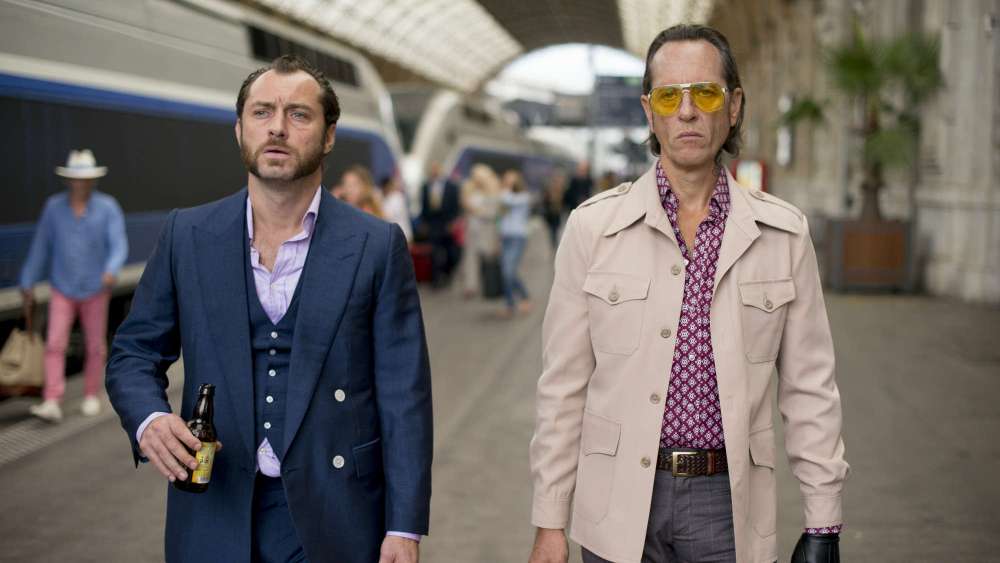Sean S. Cunningham’s Friday the 13th is inarguably one of the most successful horror franchises of all time, and for good reason. Not only did the series practically invent the campers-in-the-woods stereotype, but its villain, the hockey-mask wearing, machete-wielding Jason Voorhees, is so iconic that his image has become synonymous with the horror genre in the minds of fans and non-fans alike. However, Friday the 13th was not the first movie to use the name; the year before the first Camp Crystal Lake movie, in 1979, another film had the genius idea of exploiting the most superstitious day on the calendar, the completely unrelated Friday the 13th: The Orphan.
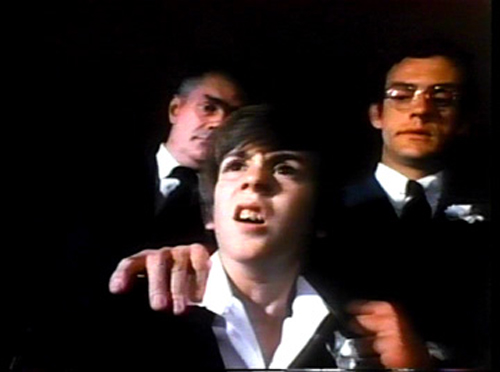
Friday the 13th: The Orphan is the story of a young boy named David (Mark Owens in his only film role). Both of David’s parents are dead, forcing him to live with his mean Aunt Martha (Peggy Feury from The Witch Who Came from the Sea). Aunt Martha is a very controlling and stifling woman, not letting David have any fun or giving him any freedom. David spends his time wandering around Aunt Martha’s home and land, dreaming about his parents, and praying to a stuffed monkey that was brought from Africa and given to him by his father. As Aunt Martha’s rules get more and more strict, David starts to lose his mind and rebel against them. Soon, accidents start plaguing the household and people begin to turn up dead. Is David responsible for the killings, or is someone just trying to drive him even more insane…or is the bloodshed all in his head?
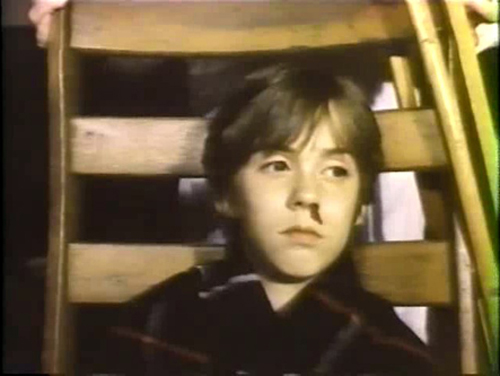
Friday the 13th: The Orphan is the only cinematic output from a man named John Ballard, who both wrote and directed the film. The screenplay is very loosely based on a Saki/H.H. Munro short story called “Sredni Vashtar” and, as a whole, the adaptation reflects Ballard’s inexperience; it is quite unevenly paced, with the first half of the film consisting of nothing but dry exposition and character development. It’s a very slow build, but by the time things start to happen in the third act, it’s worth the wait. There are a lot of cool shocks and surprises for those who are patient enough to give the film a shot.
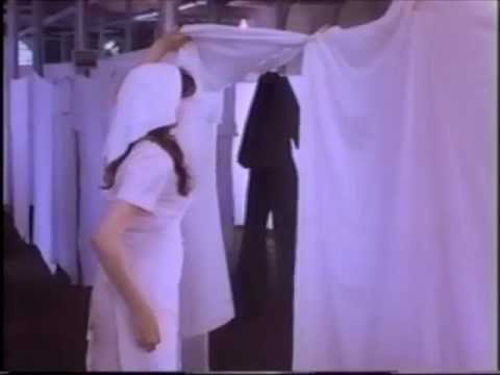
One of the elements of Friday the 13th: The Orphan that really stands out is the creative cinematography of Beda F. Batka (Little Darlings). Batka seems to be having a lot of fun with the photography, putting his camera on cranes and dollies to get all kinds of great motion shots. His inventiveness doesn’t stop there, however; he gets some great point-of-view shots as well, with the viewer being placed at the bottom of a grave that is being filled in one scene, swinging back and forth on a playground swing in another, and getting splashed by a water balloon in still another. Shot on 35mm film, the picture was made in the late seventies, and it looks it; the style of both the film and its characters is heavily dated. But, particularly in the first half of the film when there’s not much going on, Batka’s cinematography keeps Friday the 13th: The Orphan interesting.
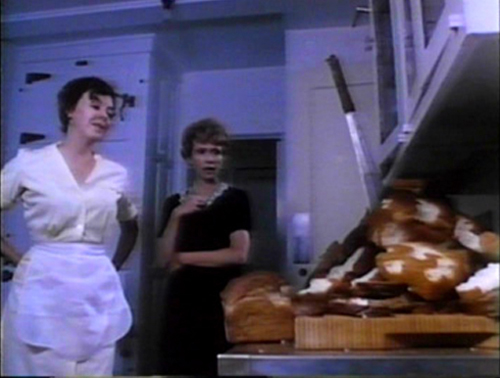
Batka’s images are not edited together with the same inspiration with which they were shot. Friday the 13th: The Orphan credits three editors (including John Ballard himself), six assistant editors, and one “editorial consultant” (who happens to be one of Woody Allen’s editors, Ralph Rosenblum). With that many cooks in the kitchen, there’s no wonder why the cuts are inconsistent. The edits seem to have been stuck together from whatever footage was available, as if the director failed to shoot enough coverage for each scene. The results are somewhat jumpy and shaky with no regard to continuity. There are also quite a few flashback scenes in which David is with his parents that, because David looks basically the same age throughout the film, confuse the viewer as to whether they are watching a memory or a real-time event. As sloppy as it is, the disjointed editing works very well in some places; one scene with David praying to his monkey is match cut with a real church scene, and a dream sequence where David imagines that he is sent to a horrifying orphanage gets inter-spliced with symbolic images of his mother and a slaughterhouse. There are a handful of bright spots like these, but most of the editing on Friday the 13th: The Orphan feels, well, like it was done by ten different people.
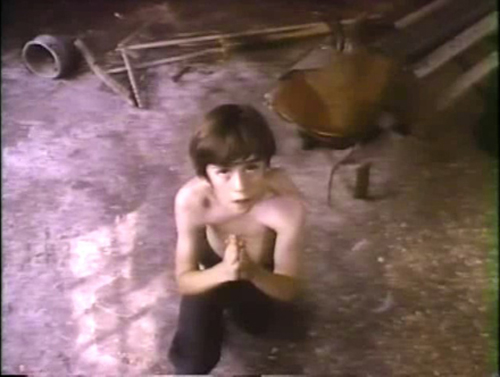
A lot of credit should be given to Mark Owens, the young actor who plays David in the film. Owens runs through the gamut of emotions, ranging from the grief of having lost his parents to the playful rebellion that results from living with an aunt whom he doesn’t like. Once David starts losing his mind, Owens really gets cooking – he plays the psychotic bad seed child well, even going so far as to alter his speaking voice into a creepy rasp when he imitates Aunt Martha, an effect that make him sound a lot like the voice of Danny’s imaginary friend in The Shining. It’s unfortunate that Owens never got to make another movie, as his performance is one of the strong points in Friday the 13th: The Orphan.
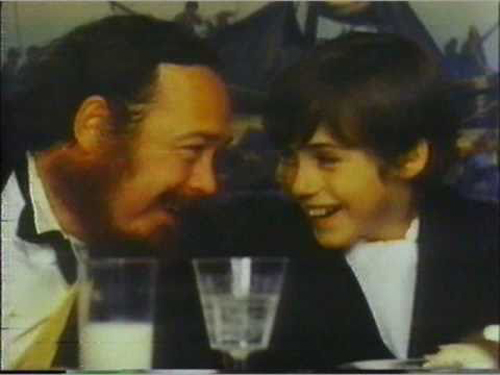
The music in Friday the 13th: The Orphan has some interesting moments. The soundtrack was written by Teo Macero (Day of Resurrection) and, in addition to the normal film score stuff, the film contains quite a bit of jazzy ragtime cues. Because it was the seventies, vocal songs were included to accompany visual montage sequences, and the placement of these songs is awkward, even for a surreal horror movie. There are two songs, “Don’t Make Me Laugh” and “Did You Ever Dream?,” that were written by Macero with lyrics by Carl Sigman (writer of “Pennsylvania 6-5000”) that just don’t seem to fit. The theme to the film is a pop song by folk singer Janis Ian called “I Need to Live Alone,” which just adds to the weird musical atmosphere. Although well composed and produced, the soundtrack to Friday the 13th: The Orphan seems a little out of place at times.
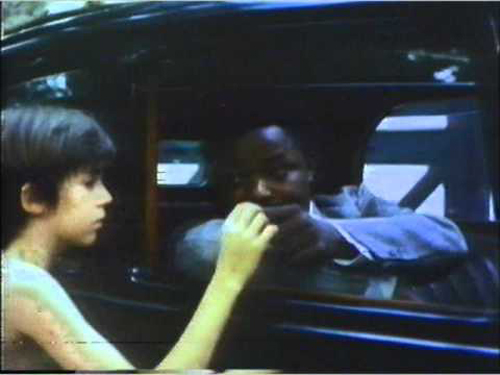
The “real” Friday the 13th hit theaters the year after Friday the 13th: The Orphan did, and it changed the landscape of horror forever. Eventually, Friday the 13th: The Orphan would be rechristened as The Orphan to avoid confusion. Nowadays, it even has to share that name with the 2009 film Orphan. While Friday the 13th and Orphan enjoy their cult classic statuses, Friday the 13th: The Orphan just wallows away in obscurity. That’s a shame, because in spite of all of its flaws, it’s a pretty entertaining film.
